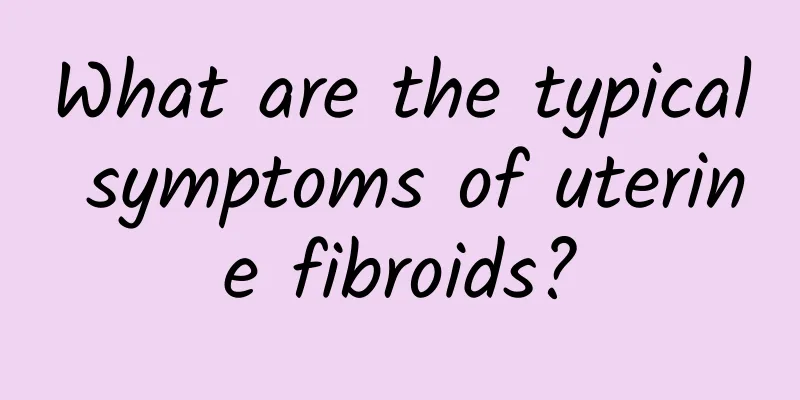What are the symptoms of pelvic inflammatory disease?

|
What are the symptoms of pelvic inflammatory disease? This is a question that many female friends want to know. Sometimes female friends feel that some of their symptoms are similar to pelvic inflammatory disease, but because they don’t know the specific symptoms of pelvic inflammatory disease, they don’t know how to judge whether they have pelvic inflammatory disease. So what are the symptoms of pelvic inflammatory disease? Since pelvic inflammatory disease is divided into acute pelvic inflammatory disease and chronic pelvic inflammatory disease, their symptoms will also be different. 1. Symptoms of acute pelvic inflammatory disease: The main symptoms of acute pelvic inflammatory disease are lower abdominal pain, fever, and increased vaginal discharge. The abdominal pain is persistent and worsens after activity or sexual intercourse. There is a history of acute infection, dull pain in the lower abdomen, muscle tension, tenderness and rebound pain, accompanied by a fast heart rate, fever, and a large amount of purulent vaginal discharge. Severe illness may cause high fever, headache, chills, loss of appetite, a large amount of yellow leucorrhea with odor, abdominal distension, tenderness, and lower back pain; nausea, abdominal distension, vomiting, diarrhea, etc. may occur when there is peritonitis; when an abscess is formed, there may be a lower abdominal mass and local compression and irritation symptoms. If the mass is located in the front, there may be difficulty urinating, frequent urination, and painful urination; if the mass is located in the back, it may cause diarrhea, tenesmus, and difficulty defecation. 2. Symptoms of chronic pelvic inflammatory disease: Systemic symptoms include low fever and fatigue. Some patients may develop neurasthenia symptoms due to the long course of the disease, such as insomnia, lack of energy, and general discomfort. Lower abdominal distension, pain, and lumbar pain are often aggravated after fatigue, sexual intercourse, and before and after menstruation. Chronic inflammation may lead to pelvic congestion, menorrhagia, menstrual disorders when ovarian function is damaged, and infertility when fallopian tube adhesions and blockages occur. Acute inflammation may cause diffuse peritonitis, sepsis, and even septic shock. Chronic inflammation may affect women's normal work and life, as well as their physical and mental health due to long-term treatment and repeated attacks. |
<<: What are the reactions to ovarian cysts?
>>: How to treat abnormal leucorrhea best and fastest
Recommend
Will doing a vaginal ultrasound during pregnancy cause miscarriage? What is the purpose of doing a vaginal ultrasound during pregnancy?
When doing a vaginal ultrasound examination, ther...
Chronic pelvic inflammatory disease is also called sequelae of pelvic inflammatory disease
Pelvic inflammatory disease, or pelvic inflammati...
How to treat moderate cervical erosion in women? Try these treatments to treat moderate cervical erosion
Many women do not take good care of their bodies ...
Will threatened abortion lead to fetal malformation?
Pregnancy preservation for threatened abortion us...
Drink this warm drink to lose weight! Drinking warm water with lemon, honey and cinnamon will help you lose weight faster!
At the end of the year, with crazy parties and de...
Does taking Fenbid for dysmenorrhea have side effects? Don't take too much
Whether it is an unmarried woman or a married wom...
Is ketogenic diet effective? A comprehensive analysis of the pros and cons of the ketogenic diet!
A year ago, I gave a corporate speech on the topi...
What is the best medicine for cervical erosion? 3 types of medication for cervical erosion
The treatment of cervical erosion requires the se...
The harmfulness of severe cervical precancerous lesions
Cervical precancerous lesions often occur and are...
Experts introduce the prevention methods of vulvar leukoplakia
The methods of preventing vulvar leukoplakia have...
What are the precautions for vulvar leukoplakia
The existence of vulvar leukoplakia seriously end...
What are the dietary considerations for threatened abortion?
Pregnancy itself requires you to pay attention to...
Can I masturbate after a miscarriage? What are the precautions after childbirth?
Spontaneous abortion is not actually a "cong...
What causes left ovarian cyst and what are the main symptoms
With the development of society, more and more pe...
Will threatened miscarriage occur during the second trimester? Will there be bleeding?
Treatment of threatened abortion requires prompt ...









